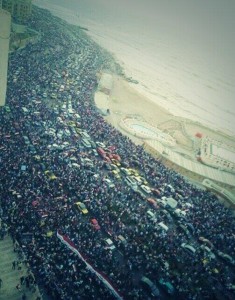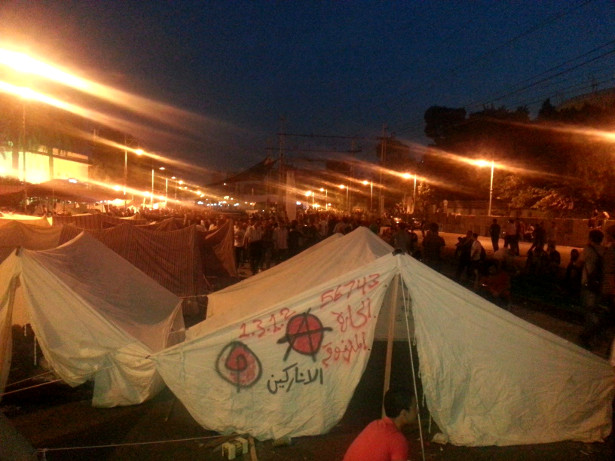[youtube]https://www.youtube.com/watch?v=VtEl4r65YFU[/youtube]
Η μεταβατική περίοδος της κρίσης, η εποχή των ταραχών, έχει πλέον εισέλθει στο δεύτερο στάδιο-κύμα της εδώ και ένα μήνα. Οι εξελίξεις είναι ταχύτατες και το κεφάλαιο προετοιμάζεται να απαντήσει με ολοένα και σκληρότερη καταστολή του προλεταριάτου (των μεσαίων στρωμάτων συμπεριλαμβανομένων) που ξεσπάει με διάφορους τρόπους, ανάλογα με τη δομή και την ιεραρχία των αντιθέσεων σε κάθε κοινωνικό σχηματισμό. Οι διαφορές αυτές αποτελούν την έκφραση μιας ενότητας, της δομικής κρίσης του νεοφιλελευθερισμού, μιας κρίσης παρατεταμένης, δηλαδή πολύ δύσκολα αντιμετωπίσιμης, μιας κρίσης που η αναδιάρθρωση που απαιτεί το περιεχόμενο της θέτει σε κίνδυνο την κοινωνική ειρήνη συνολικά.
Στην Αίγυπτο η Ταχρίρ αλλά και οι άλλες πλατείες και δρόμοι ξαναγέμισαν κόσμο, τόσο κόσμο που η κανονιστική γλώσσα του θεάματος ονόμασε τη χθεσινή μέρα “τη μεγαλύτερη διαδήλωση στην ιστορία”, παίρνοντας εκ νέου τη σκυτάλη του “κέντρου του κόσμου” από την Ταξίμ, την ίδια ώρα που για την αμερικάνικη ήπειρο το κέντρο του κόσμου εχθές βρισκόταν έξω από το στάδιο Μαρακανά, με τους διαδηλωτές να υπονομεύουν την παραγωγική διάσταση του θεάματος στον πυρήνα της και το κράτος να απαντάει ανάλογα.

Η απάντηση του κεφαλαίου ως τάξης ανεξάρτητα από τη διάρθρωση που εμφανίζεται στον πολιτικό συσχετισμό θα είναι πλέον full scale καταστολή, δηλαδή η κήρυξη του πολέμου ενάντια στο προλεταριάτο (για την οποία είχαμε μιλήσει πρώτη φορά στις αρχές του 2011, εδώ) παίρνει μια αληθινά στρατιωτική διάσταση. Είτε η πολιτική προσωποποιείται στον Ερντογάν-Μόρσι, είτε στην αριστερά του νεοφιλελευθερισμού, Κίρχνερ-Λούλα-Ρούσεφ και σία, η απάντηση είναι η ίδια την κρίσιμη στιγμή. Μπορεί να υπάρχουν διαφορετικοί χρωματισμοί, την περίοδο της ειρήνης, χρωματισμοί που δεν πρέπει να υποτιμούνται γιατί αυτοί καθορίζουν το ειδικό περιεχόμενο της σύγκρουσης σε κάθε κράτος, αλλά την ώρα που “πετάγεται το καπάκι της χύτρας” το κράτος πλέον φοράει τα χακί, και ρίχνει πλαστικές και κανονικές σφαίρες στο ψαχνό.
[youtube]http://www.youtube.com/watch?v=IZXjGYtxTdM[/youtube]
Το κράτος, που είναι στο επίκεντρο αυτής της διένεξης προς το παρόν, αποτελεί τη δύναμη αλλά και την αχίλλειο πτέρνα της τρέχουσας φάσης του νεοφιλελευθερισμού. Το (μη-)αίτημα για δημοκρατία είναι ο λόγος ενός αγώνα που υπερασπίζεται το ταξικό ανήκειν και συγκροτείται ως τέτοιος ακριβώς επειδή είναι η αναδιάρθρωση του κράτους που βρίσκεται αυτή τη στιγμή σε μια φάση έκρηξης της εσωτερικής της αντίφασης, από τη μία πλευρά είναι απαραίτητο να επιταχυνθεί από την άλλη είναι εξίσου απαραίτητο να επιβραδυνθεί για να διατηρηθεί η κοινωνική ειρήνη. Το κράτος μετατρέπεται σε κράτος έκτακτης ανάγκης καθώς πρέπει να καθορίσει το πλεονάζον εργατικό δυναμικό με δομικούς-πολιτικούς όρους, αλλά αυτός ο καθορισμός, φαίνεται ολοένα και περισσότερο καθαρά πλέον ότι δεν μπορεί να γίνει αναίμακτα. Οι αποκλειόμενοι-υπεράριθμοι βρίσκονται μπροστά στα οδοφράγματα, έστω κι αν δεν μοιάζουν και πολύ μεταξύ τους, έστω κι αν οι πρακτικές τους συγκροτούν την άνιση δυναμική της εποχής των ταραχών, έστω κι αν ανά πάσα στιγμή μπορεί να συγκρουστούν μεταξύ τους, η ουσία είναι ότι η αναδιάρθρωση επιβάλλει τη συνάντηση τους στην πρώτη γραμμή του μετώπου.
Continue reading →







